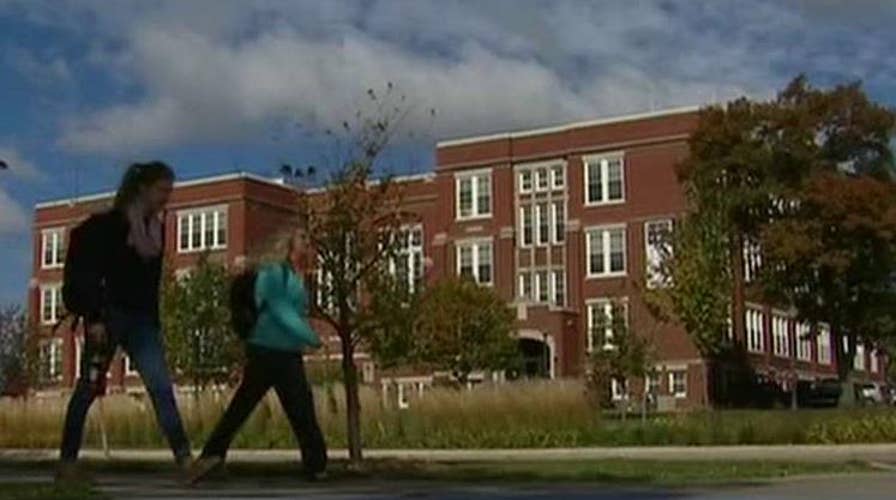UW-Madison spends $4 million on failing diversity program
Student says 'People' is wasting tax dollars
College-bound high school students who have had trouble with the law may still have to check a certain box the Obama administration wants off of admissions forms.
Not all colleges and universities are buying into the Department of Education’s “Beyond the Box” campaign to stop admissions officers from forcing applicants to disclose criminal and disciplinary histories. The administration believes such probing is a barrier to minorities, but critics say schools have a right to know if incoming students have rap sheets.
“It’s a nationwide social experiment putting college students at risk,” said Dan Gainor, of the Media Research Institute. “If you commit crimes – sexual assault, domestic violence and others – we have a right to know and decide whether we want to associate with you.”
Earlier this year, the Department of Education sent colleges around the country a letter urging them to get rid of the line of questioning that could bar students "who have been involved with the justice system.”
The Department of Education's recommendation could have broad reach through the Common Application, a form used by nearly 700 schools which enables college hopefuls to apply to multiple schools using one form.
The Common Application, a nonprofit formed in the 1970s by school administrators to smooth the application process, had since 2006 included in a box to be checked if the applicant has ever been found guilty of a “felony, misdemeanor or other crime.” The "other crime" portion was cut this year and more changes could be coming.
Common Application is studying the question to determine if any more changes will be made for the 2017-2018 year, spokesperson Aba Blankson acknowledged.
Among public schools, 43 percent of directors surveyed by the organization last year wanted full reporting of all infractions; 46 percent wanted at least some disclosure and only 11 percent were in favor of not asking applicants about legal or disciplinary records. Administrators at private institutions were even more in favor of disclosure, with just 1 percent saying no such questions should be asked.
FoxNews.com reached out to numerous private and public higher education schools across the country, with mixed response.
The University of Idaho has no current plans to stop asking about applicants' criminal background. But Director of Admissions Cezar Mesquita stressed that a checked box doesn’t mean a dead end.
“We weigh the seriousness of any offenses and consider them holistically in conjunction with other application information provided,” Mesquita said.
The University of Washington asks applicants if they have been convicted of a violent felony and if he or she is required to register as a sex offender. Officials say it does not result in discrimination.
“We have tracked effects of this policy over the years, and there is no evidence that students who report on these backgrounds have been disadvantaged in the admissions process,” school spokesman Norman Arkans said.
Colorado College requires disclosure, said Mark Hatch, vice president for enrollment management, who added that it can benefit an applicant.
“On occasion, these can be very positive statements that allow the Admission Committee to see strong moral conviction and how a young adult takes responsibility and owns a mistake,” Hatch said.
The federal push does seem to be having an effect. Most institutions contacted by FoxNews.com said existing questions pertaining to criminal and disciplinary histories will “come under review” to be limited or for possible removal in the coming months.
The University of Illinois and University of Florida currently ask about criminal histories in the application process, but officials at both schools said they are considering the government’s suggestions. Officials at University of the Pacific, in Stockton, Calif., said they intend to involve students in the discussion of whether or not to drop the questions. The University of Colorado plans to form a committee of campus leaders over the summer to look at possible changes.
Other schools, including the University of California system, University of Texas, the College of Idaho and the University of Utah, told FoxNews.com they do not query applicants on criminal history.
A University of California official said that in some cases the school may ask students who have already been accepted about past criminal history on other forms, such as applications of on-campus housing.
The Department of Education also recommended colleges offer any existing “justice-involved individuals” special support services including counseling, career guidance, mentoring and legal aid.
Gainor said the issue is not one of discrimination, but of schools being able to ensure a safe and law-abiding student body.
“This isn’t about people of color,” Gainor said. “This is about people of crime and keeping violent ex-cons away from unsuspecting college students.”
Jamie Brennan contributed to this report.


